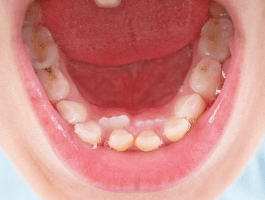 Babies and toddlers Babies and toddlers
Many parents worry that their baby or toddler is not old enough to see a dentist and will not want us to look at their teeth.
However, as paediatric dental specialists, we know all the techniques to help them feel comfortable and encourage them to cooperate.
Importantly, we go at a pace that works for your child. This may mean giving them breaks to let them play.
The best time to start dental visits is at the 12-month mark. |
 Conditions related to teeth, gums and bones Conditions related to teeth, gums and bones
Even with good brushing habits and a healthy diet, some children will inevitably develop certain dental conditions.
As paediatric dentists, we have the skills and experience to diagnose and treat these conditions.
Common child-specific dental conditions include:
- Shark teeth
- Chalky molars
- Tooth decay unrelated to diet and oral hygiene
|
 Children with additional needs Children with additional needs
Compassion, patience and expertise. That’s what you can expect with the team at Norwest. Our extensive training equips us to treat children with additional needs, such as:
- ADHD
- Intellectual and developmental disabilities
- Autism Spectrum Disorder
- Anxiety
- Physical disabilities and movement disorders
|
 Phobias and anxiety Phobias and anxiety
In our extensive experience with anxious kids, we know that they’re often on high alert and sensitive to change.
And although our clinic is always calm and comfortable, we understand some children need extra support.
That’s why we utilise special techniques to help settle children who are feeling overly anxious. |
 Children who need sedation Children who need sedation
While sedation isn’t always the answer, it can be a valuable tool in helping some children during their dental treatments.
As paediatric specialists, we can identify which children will be able to cope with in-chair procedures – and which ones might benefit from sedation.
Whatever your child’s circumstance, our focus is to make their experience with us as comfortable and positive as possible. |

 Babies and toddlers
Babies and toddlers Conditions related to teeth, gums and bones
Conditions related to teeth, gums and bones Children with additional needs
Children with additional needs Phobias and anxiety
Phobias and anxiety Children who need sedation
Children who need sedation